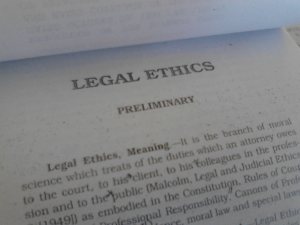
A lawyer never gets rich, my law professor told me, if he practices law strictly according to the ethics of the legal profession as embodied in the Code of Professional Responsibility (CPR).
That statement is not without implications. That implies that a rich lawyer is necessarily unethical. That also implies that the CPR is meant to impoverish a lawyer.
The truth, however, is that the CPR was put in place, according to Dean Ernesto Pineda, "to guard against the abuses and ill of the profession such as dishonesty, deceit, immorality, negligence, slothfulness, lack of diligence and the many forms of malpractice of the members of the Bar."
Without these rules found in the CPR, Dean Pineda said, "The practice of law which covers a wide range of activities...will be transgressive, anarchic, riotous, lawbreaking, defiant and disobedient to courts..."
Positively, the CPR will "raise the standard of the legal profession, encourage and enhance the respect for the law, assure an effective...administration of justice, assist in keeping and maintenance of law and order..."
"It also provides the basis for the weeding out of the unfit and the misfit in the legal profession for the protection of the public."
Promulgated on June 21, 1988, the CPR provides the rules of conduct for lawyers who are not members of the judiciary. It has twenty-two Canons which are grouped under four Chapters. All four Chapters refer to the four-fold duties of the lawyer to the Society, to the Legal Profession, to the Courts, and to the Client.
In the subsequent posts, I will try to discuss each Canon and provide my own observation in 300 words to also help the public understand the legal profession, and the ethical tenets by which lawyers are, theoretically at least, bound to follow.

No comments:
Post a Comment